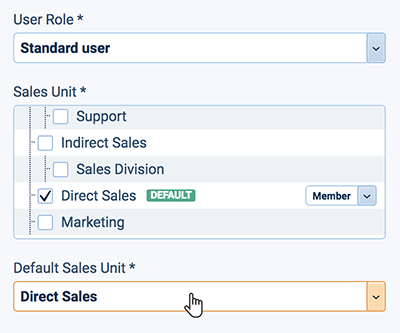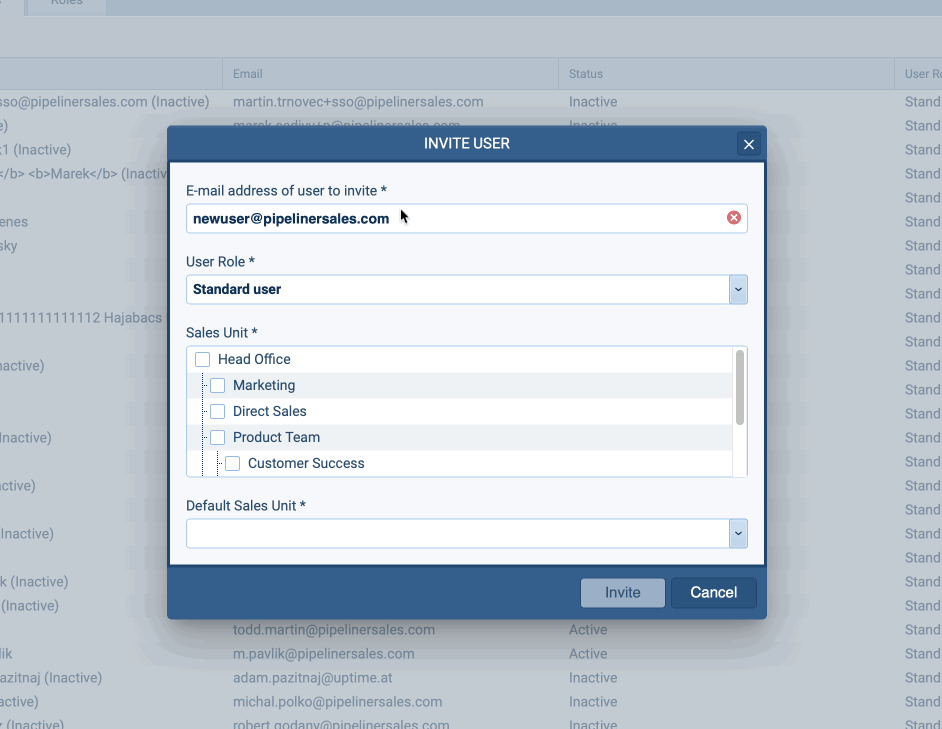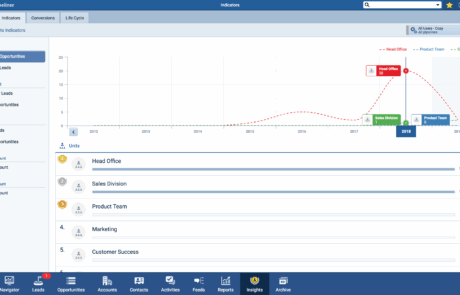In today’s complex business world, a one-size-fits-all CRM approach often leads to chaos. When your North American Sales team’s pipelinePipeline Sales pipelineis a visual representation of the stage prospects are in the sales process. is cluttered with service tickets, or your Asia-Pacific dataData Data is a set of quantitative and qualitative facts that can be used as reference or inputs for computations, analyses, descriptions, predictions, reasoning and planning. is mixed with your European accounts, focus suffers and security is compromised.
Pipeliner CRM’s Business Units feature solves this by allowing you to partition your CRM environment instantly. It’s like having multiple specialized CRMs running on a single, unified platform.
This powerful feature delivers:
- Instant Data Isolation: Create secure, segregated environments for any team, region, or productProduct Product refers to anything (an idea, item, service, process or information) that meets a need or a desire and is offered to a market, usually but not always at a price. line.
- Zero Cross-Contamination: Users are assigned to specific Business Units, meaning they only see and interact with the relevant data—Accounts, Contacts, Leads, Opportunities, and Activities—that belong to their assigned Business Unit. Data from other units is simply invisible to them.
- Effortless Scaling: Deploy new units globally without complex, resource-intensive IT overhauls.
The Right Process for Every Team: Unmatched Customization, Unified Control.
This isn’t just about hiding data; it’s about empowering teams with workflows built specifically for them. Business Units allow for truly independent configuration while maintaining a single, easy-to-manage administrative layer.
Maximize Relevance with Independent Configuration
Each unit can have its own unique sales pipeline stages, custom fields, document templates, and lead qualificationLead Qualification Lead Qualification is the process of determining whether a potential customer has the characteristics of your company’s ideal client (such as sufficient purchasing ability and a higher likelihood of buying your product). rules. This ensures every team follows a process that is 100% relevant to their product, market, or service—eliminating irrelevant forms or confusing, generic steps.

Govern with Confidence
Your Administrator maintains complete, unified visibility across all Business Units for reporting, auditing, and high-level strategy. They determine exactly which units a userUser User means a person who uses or consumes a product or a service, usually a digital device or an online service. belongs to, controlling their access and visibility with precision. At the same time, every frontline user stays focused only on their silo.
Maintain Consistency with Global Templates
Achieve the perfect balance of global consistency and local flexibility. You can set up a “master” templateTemplate Template is a generic file with a framework showing the standard sections or features of a specific kind of document, used to create a new document of the same type faster and easier. and allow Business Units to inherit common settings (such as standard contact fields) while customizing everything else that requires local tailoring.

Who Needs Pipeliner CRM Business Units? Strategic Use Cases
If your business looks like this, you need Pipeliner CRM Business Units to operate at peak efficiency:
- Global Operations: Separate U.S., EMEA, and APAC sales teams. Please provide them with unique currencies, processes, and language settings without compromising global data integrity. The Pipeliner CRM advantage: Region-specific focus.
- Multi-Product Portfolios: Isolate sales for a ‘Software Product Line’ from a ‘Hardware Product Line.’ This ensures specialized sales cycles, customized fields, and accurate, dedicated reporting for each portfolio. The Pipeliner CRM advantage: Product-line precision.
- Sales & Service Separation: Keep your pipeline of Leads and Opportunities strictly separated from Customer Service Tickets and Project Management data. The Pipeliner CRM advantage: Clean data funnels that ensure sales reps are never distracted by service noise.
Frequently Asked Questions (FAQ)
A Business Unit is a specialized, logical container used to partition your CRM data and settings strictly. It creates isolated environments within your single Pipeliner organizationOrganization Organization is a cohesive group of people working together and formally bound by a shared identity (e.g., one team, company, club, etc.) and a common purpose (e.g., business growth, athletic victory, etc.).. This segmentationSegmentation Segmentation is the process of subdividing a large market into distinct partitions (or segments) based on demographics and other factors, with the aim of formulating and implementing separate strategies to better engage the consumers in each segment. is crucial for large or scaling businesses to separate data by geography, product line, or department (e.g., separating Sales data from Service data). It’s the foundational layer for security, access control, and specialized workflows.
Business Units enforce a critical security boundary. Users must be explicitly assigned to a Business Unit to view or interact with the data inside it (such as Accounts, Leads, and Opportunities). This strict access control ensures that regional teams only view regional data and that sensitive data remains isolated, significantly reducing the risk of internal data exposure and supporting regulatory compliance efforts.
Absolutely. This is a core benefit. Unlike simple filtering, Business Units provide valid specialization. Each unit can be configured with its own:
- Pipeline Stages: Unique sales cycles tailored to a specific product or region.
- Custom Fields: Data fields relevant only to that unit’s operations.
- Document Templates: Customized contracts or proposals.
- Security Roles: Distinct permissions assigned to users within a specific unit.
This prevents processes from bleeding into other departments, resulting in focused and error-free execution.
Pipeliner provides hierarchical management. You can establish a Global Template (or Root Business Unit) containing core organizational standards (like universal contact fields or basic security roles). Child Business Units can then inherit these necessary settings while maintaining the flexibility to customize their unique processes, striking the perfect balance between corporate governance and local team efficiency.
Yes. While a standard user is typically restricted to the data within their assigned unit(s), the System Administrator maintains complete, unified visibility across all Business Units. This capability is essential for aggregated reporting, auditing, performance comparisons, and high-level strategic oversight of the entire global organization.
Yes, users can be assigned to multiple Business Units. This is ideal for managers, shared service teams, or executives who need visibility and access across different regions or product lines. When a user is part of multiple units, their access privileges are aggregated, allowing them to see all the data and records owned by those units.
Learn More About Pipeliner CRM
Take a no-obligation 14 day trial of Pipeliner CRM.
No credit card info required – just experience for yourself how it could impact your sales.

